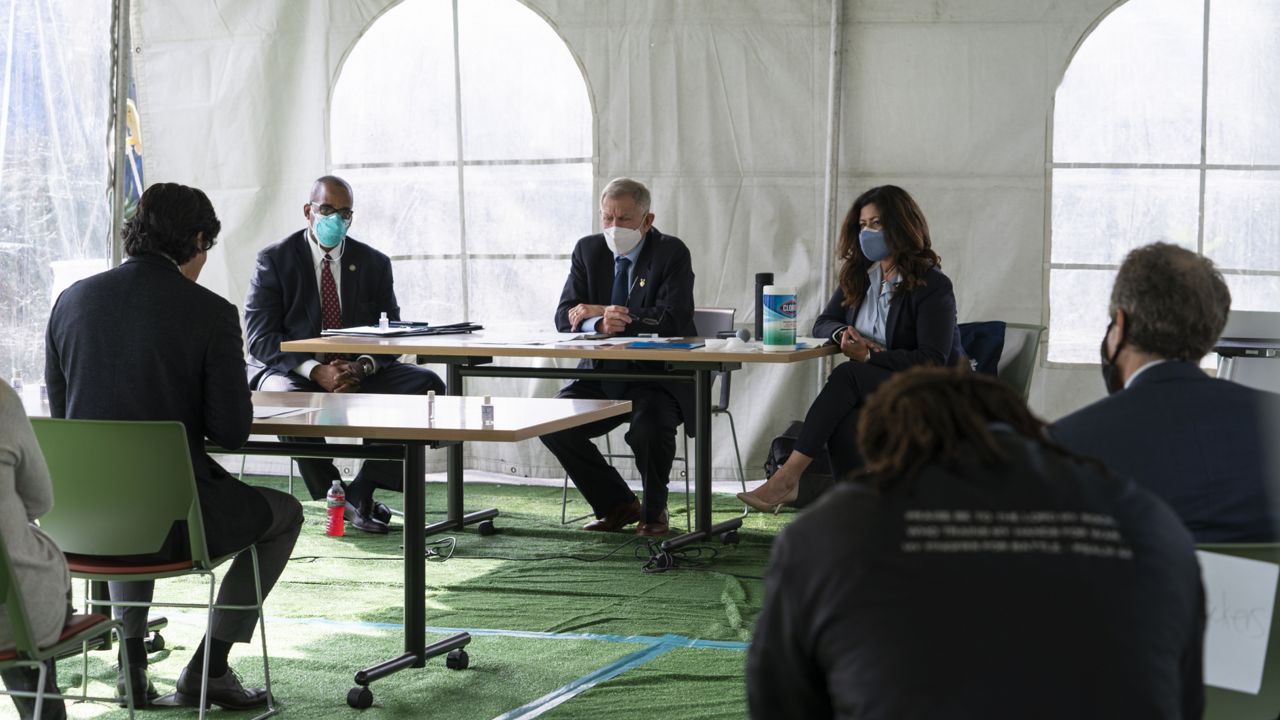LOS ANGELES (CNS) — A judge presiding over attempts to resolve Los Angeles' homelessness crisis asked Thursday for suggestions on how he might deploy the power of the federal court to speed up efforts to get the increasing numbers of indigent persons living on city sidewalks into housing.
In an unusual federal court hearing held in a tent outside a skid row women's center, U.S. District Judge David O. Carter recounted the situation he witnessed early last Friday morning during a fierce downpour in downtown Los Angeles, where homeless elderly women and barefoot mentally ill individuals had nowhere to go during the rainy, cold weather.
Homelessness in downtown Los Angeles is ultimately "an ever-increasing spiral of death," Carter said.
The hearing was the first court session of the new year in a 10-month attempt to settle a federal lawsuit seeking to compel Los Angeles city and county officials to quickly address the homelessness crisis.
The plaintiff is the L.A. Alliance for Human Rights — a coalition of nonprofit organizations, service providers, small-business owners, residents, and community leaders — that has thus far won an agreement between the city and county to provide 6,700 beds, 6,000 of which are due in two months.
About 8,000 beds are already in place for the needy, but bureaucratic tangles and neighborhood resistance to interim or supportive housing have continually blocked the path forward, according to the L.A. Alliance.
On Wednesday, Los Angeles City Councilman Mike Bonin blasted the city and county as "structurally incapable" and not "nimble or forceful enough" to adequately respond to the homelessness crisis, and called for a judicial consent decree under Carter's supervision to compel immediate action. If the parties agree, such a decree would end the lawsuit with a settlement giving Carter power to order the city and county to build shelters and provide services.
The judge asked attorneys for all sides to submit briefings by Feb. 16 on how the federal court might possibly intervene in the case.
Earlier this week, Carter indicated he was irked by what he considers the city's inertia in dealing with homelessness, especially on skid row.
Los Angeles Mayor Eric Garcetti was invited to the tent meeting, but said he had a previous engagement that prevented him from attending. However, he told reporters Wednesday that he met with the judge and shared a "sense of urgency" about the situation.
"This is immensely hard work, but when you look at it, there isn't hardly a week goes by without one or two either groundbreakings or openings of new permanent housing, of new shelters that are opening, of tiny home villages," Garcetti said.
"There is distinct progress, and like the judge, I share that same sense of urgency," the mayor said Wednesday, adding that he hopes the city will be able to come to a "global settlement" with the L.A. Alliance "because I think we share the same things — get more people off the streets even more quickly."
Garcetti said there is no city in the country doing more than Los Angeles to combat homelessness, but like most residents he asks "why do we still have so many tents? We've got to keep doubling down on those solutions, and that sense of urgency."
In past months, the court has focused on relocating the homeless away from freeways, but "nothing substantial has been done to remediate the appalling and dangerous conditions in Los Angeles' Skid Row," Carter recently wrote.
A January 2020 count by the Los Angeles Homeless Services Authority found there were more than 66,400 homeless people living in Los Angeles County — the largest single concentration in the state. That included more than 41,000 within the city limits. Both figures were up more than 12% from the previous year. The annual count was not done last month because of the coronavirus pandemic.
Carter noted that 1,383 homeless people died in the city and county of Los Angeles last year, a 32% increase from 2019.
The Rev. Andy Bales, CEO of the Union Rescue Mission, accompanied Carter on his skid row tour last Friday, said at the hearing that Los Angeles is facing a crisis of Federal Emergency Management Agency proportions, and it requires "a FEMA-like response."



